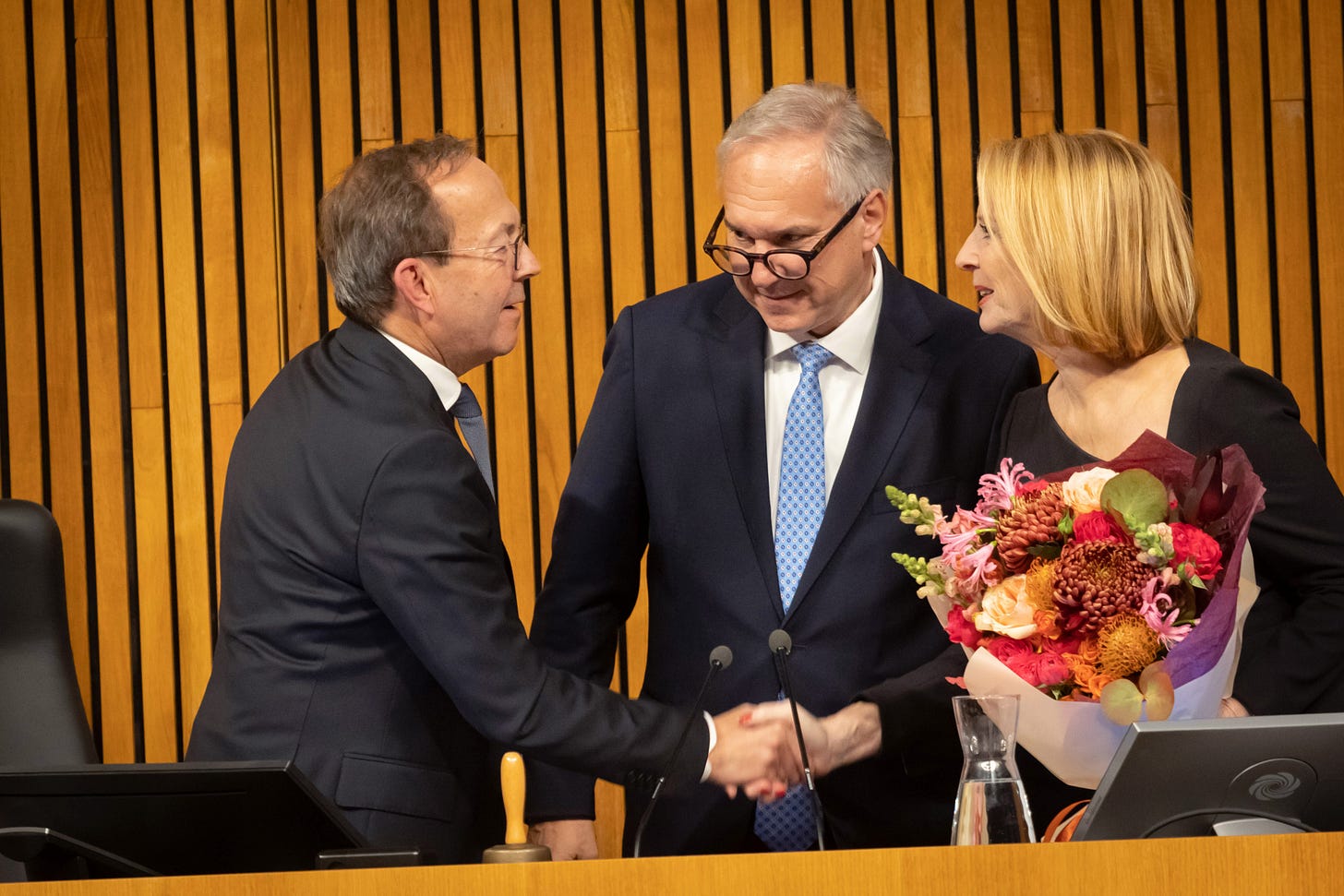Crown Of Roses, Crown Of Thorns
Walter Rosenkranz, member of the greater German nationalist fraternity Libertas, has been elected president of the Austrian parliament

Servus!
Last week, Austria’s parliament sat for the first time since the election on September 29, won by the far-right Freedom Party (FPÖ). The body had two main orders of business: the swearing-in all of 183 MPs and the election of a new presidium made up of three MPs that, together, serves a similar function to the Speaker of the House and their deputies. Parliamentary custom dictates that the president of the Austrian parliament should come from the largest party in parliament, and thus for the first time since 1945, a member of the FPÖ, Walter Rosenkranz, was elected president, albeit with the backing of only 100 MPs1.
Rosenkranz, born 1962, was first elected an MP in 2008 and served as head of the FPÖ parliamentary party from 2017 to 2019. He was the FPÖ’s candidate for president in 2022, coming second with 17.7 percent of the vote; his most recent role in politics was as a public ombudsman appointed by the president, Alexander Van der Bellen. Like many leading FPÖ MPs, Rosenkranz is also a member of a greater German nationalist fraternity, Libertas, which has declared itself a ‘white’ fraternity and, in 1878, was the first greater German nationalist fraternity to ban Jews from becoming members.
For this reason—likewise for his previous praise for the Nazi jurist Johann Karl Stich—Rosenkranz’s candidature was condemned by the Austrian Union of Jewish Students (JöH) and the NGOs SOS Mitmensch and the Mauthausen Committee. The Green Party refused to back Rosenkranz’s bid for the presidency, while Oskar Deutsch, president of the Jewish Community of Vienna, wrote a letter to all parliamentary parties bar the FPÖ asking them whether a member of a greater German nationalist fraternity really deserves the responsibility of leading Austria’s parliament.
That responsibility, after all, includes tending to the National Fund for the Victims of National Socialism, which was established under the auspices of parliament in 1995 and remains tasked with paying compensation to victims of National Socialism, caring for Austria’s Jewish cemeteries, and leading projects in the field of Holocaust remembrance. “Granting the leadership of the National Fund to an FPÖ politician who has paid homage to Nazis in his writings mocks National Socialism’s victims and their descendants,” JöH president Alon Ishay said.
“Jewish life in Austria has absolutely nothing to fear from me,” Rosenkranz said in an interview with the ORF following his election—one of those statements that is supposed to provide reassurance but begets its very opposite. In his acceptance speech last week, Rosenkranz promised that the “fight against antisemitism in this house will continue” during his presidency. Under parliament’s outgoing president, Wolfgang Sobotka of the conservative People’s Party (ÖVP)—himself an unpopular and problematic figure—antisemitism awareness and the struggle against antisemitism became, to his credit, a centerpiece of the body’s work.
The presidency of the Austrian parliament is not merely an administrative role. As Sobotka demonstrated, it is also a platform that politicians can use to shape the national conversation. Signs as to how Rosenkranz plans to use his newfound prominence emerged late last week when he extended an invitation to Hungary’s illiberal prime minister Viktor Orbán to visit parliament and gave a 12-minute interview to the former leader of the far-right identitarian movement in Vienna that was broadcast on a small, schismatic news channel. “Rosenkranz was elected by a majority of MPs. In this role as president of the Austrian parliament, he has to serve both Austria and parliament—not the FPÖ,” the Social Democratic Party (SPÖ)’s Jörg Leichtfried warned. “His time as a ‘soldier of the party’ is over.” Or so it should be, though that isn’t how Rosenkranz is behaving right now.
Bis bald!
Thank you for subscribing to the Vienna Briefing. A personal recommendation is the best way to grow the reader community, so if you know someone who might be interested in this newsletter, consider sharing it with them today.
The Vienna Briefing is a free, reader-supported publication made possible by your generous contributions. If you like and would like to support my work on this newsletter, think about sending me a tip.
Exploratory Discussions Continue
The leaders of the ÖVP and SPÖ, Karl Nehammer and Andreas Babler, are set to meet again on Monday as part of exploratory discussions about forming a coalition government. In the meantime, sub-teams from both parties are meeting to set the policy agenda for future formal coalition negotiations.
Village Mayor Killed
Franz Hofer, mayor of Kirchberg ob der Donau, a village with around 1,000 residents in Upper Austria, was shot dead on Monday. Police in the state were searching for a 56-year-old man, currently on the run, as the main suspect in the case.
Kristallnacht Demo Halted
Far-right supporters have called off a demonstration in support of the FPÖ planned in Vienna for November 9. The date marks the anniversary of Kristallnacht during which the Nazis murdered 27 Austrian Jews, arrested 6,000 more, ransacked Jewish-owned businesses, and destroyed all bar one of Vienna’s synagogues.
The other members of the new presidium are second president of the Austrian parliament Peter Haubner (People’s Party, ÖVP) and third president Doris Bures (Social Democratic Party, SPÖ).



